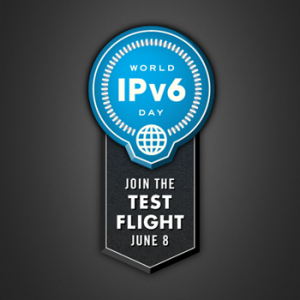Today, as the World IPv6 Day test fired up, Facebook, Google, and Yahoo traditionally online competitors are coming together with hundreds of other major organizations to pool resources for solving a problem of the Internet space. 
The World IPv6 Day celebrates and spreads knowledge of the new IPv6 (Internet Protocol version 6) standard for identifying locations on the web and the devices attached to it. Until recent years, communications and technology companies have been using IPv4 to address servers and user devices but this standard allows for just over four billion possible addresses. Now, the numbers are running out, because a number of people using Internet space is constantly increasing. Entire regions of the world have no more addresses available. With new IPv6, which has a unbelievably huge address space the problem solution is found.
Though it’s not that easy as it seems. One company like Google wouldn’t be able to turn on IPv6 by themselves but joining forces could make it possible.
«We’re not switching to IPv6, we’re becoming bilingual: We’re continuing to support IPv4, but adding IPv6 compatibility,» Donn Lee, Facebook’s lead engineer on IPv6 says. «It’s the first time it’s ever been done on global scale, with such huge participation around the world.»
The World IPv6 Day is supported by hundreds of major organizations and brands such as YouTube, Cisco, Mozilla, Microsoft Bing, Nokia to name just a few.
Nokia has been working with IPv6 standardization and development activities since the launch of IPv6 in the 90’s. Today, Nokia’s Symbian devices have really good IPv6 support for 3G and GSM access and thus are the ones that operators most often use to set-up their IPv6 cellular networks.
Currently Nokia’s Ovi Browser is running in beta. The browser is designed to work using an intermediary server, or proxy, operated by Nokia. This proxy server cuts out unnecessary data, slimming the pages down for mobile devices. This allows for lower data charges and a smooth experience, even where bandwidth is limited. The browser on the phone can conduct all its web transfers using IPv6, even if the sites the users are interacting with only use IPv4. The proxy automatically translates the data between the two protocols as it works.
Global deployment of IPv6 is crucial for connecting the next billion people to the Internet, and today is indeed a s the 24-hour test runs to weed out any bugs and accelerate adoption, is probably the biggest experiment in the history of the Internet.